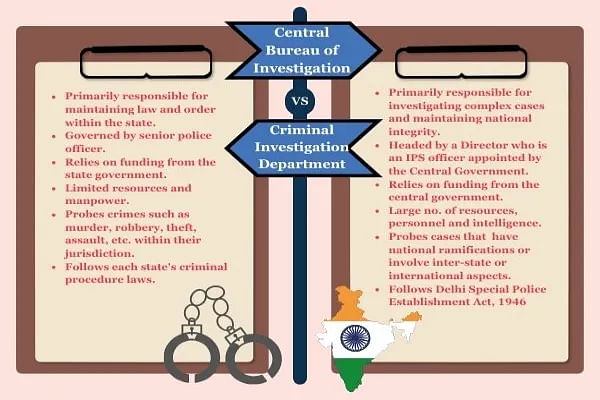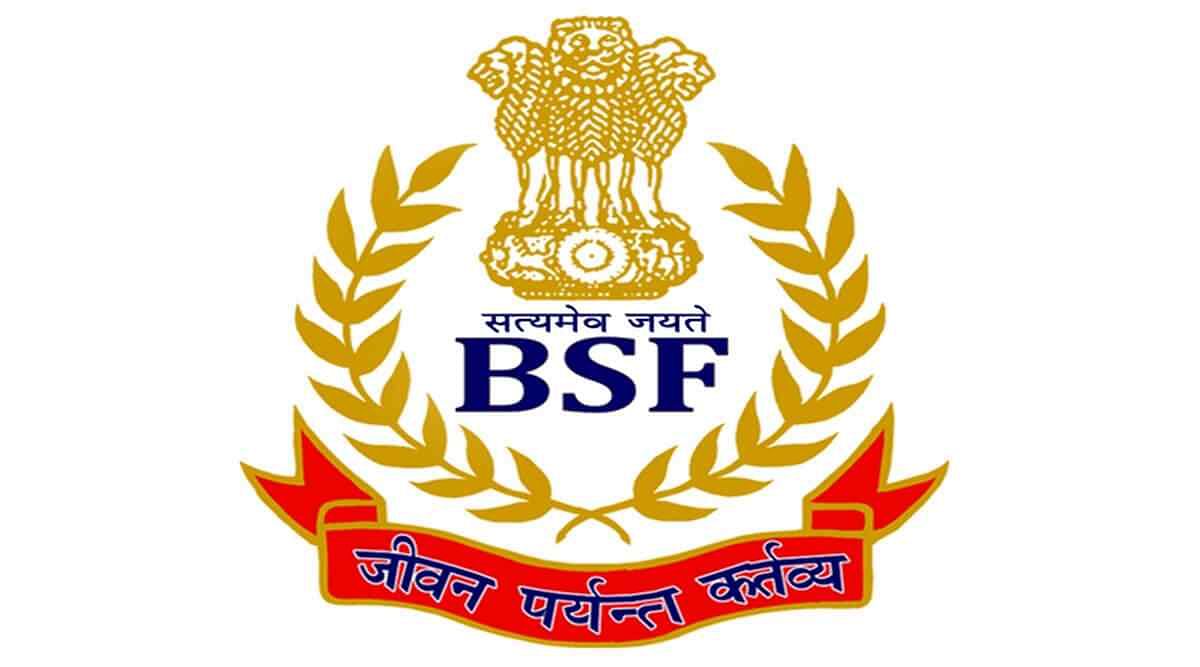The difference between CID and CBI is that the CID is responsible for investigating all kinds of crime related to the society, whereas the CBI works at the national level and is instructed by the government to investigate special federal cases.
CID is an investigating agency working at the state level whereas CBI is an agency working at the national level. The CID investigates general criminal cases associated with society and public life, while the CBI investigates crimes at the state and federal level.
What is CID?
CID, which stands for Crime Investigation Department, is a part of the state police and has certain limits on its authority to work in the state. In contrast, CBI, which stands for Central Bureau of Investigation, is a specialized agency at the national level established to investigate and examine crimes all over the country.
What is CBI?
In India, the two forces investigating complex crime cases are the CID (Criminal Investigation Department) and CBI (Central Bureau of Investigation). Candidates who are preparing for various government exams should familiarize themself with this article on the difference between CID and CBI as there are direct questions asked about both the agencies in exams like SSC, UPSC CSE, and State PCS.

Also Check: Government Jobs vs Private Jobs: What's the Difference?
Differences Between CID and CBI
Both agencies play a vital role in maintaining law and order and in investigating complex cases. However, there is a specific difference between CID and CBI that sets them apart, and these differences are shared in the table below.
|
Parameters |
CID (Criminal Investigation Department) |
CBI (Central Bureau of Investigation) |
|
Organizational Structure |
The branches of CID exist in various states within their respective police forces |
The CBI is a central agency that operates independently of state police forces. |
|
Primary Responsibility |
Primarily responsible for maintaining law and order within the state |
Primarily responsible for investigating complex cases and maintaining national integrity |
|
Leadership |
Usually headed by a senior police officer, such as a Director General of Police |
Headed by a Director who is an IPS officer appointed by the Central Government |
|
Funding |
Depends on the state government for funding and resources |
Funded by the central government and has its own budget allocation |
|
Resources and Manpower: |
May have limited resources and manpower compared to national investigative agencies |
Equipped with a broader range of resources, expertise, and access to intelligence |
|
Role in Investigations |
Often involved in day-to-day crime prevention and local investigations |
Often involved in cases requiring expertise, technical capabilities, or involving multiple jurisdictions |
|
Primary Focus |
Generally focuses on maintaining law and order and preventing crime within their jurisdiction |
Primarily focuses on major cases involving corruption, high-ranking officials, or crimes of national importance |
|
Types of Cases Handled |
Investigates crimes such as murder, robbery, theft, assault, etc. within their jurisdiction |
Investigates cases that may have national ramifications or involve inter-state or international aspects |
|
Legal Authority |
Investigative powers are granted under the state's criminal procedure laws |
Empowered by the Delhi Special Police Establishment Act, 1946, to investigate cases at the national level |
|
Specialization |
May specialize in specific areas such as cybercrime, narcotics, or economic offenses based on the state's requirements |
Has specialized branches for various types of investigations, including economic offenses, anti-corruption, and special crimes |
|
Initiation of Cases |
Investigates a wide range of criminal offenses within their jurisdiction |
Investigates cases referred by state governments, courts, or upon a request from other agencies |
|
Reporting Structure |
Works under the state police department or law enforcement agency |
Works under the Ministry of Personnel, Public Grievances, and Pensions, Government of India |
Also Check: UPSC Jobs List with Salary
Historical Evolution of CID vs CBI
The Criminal Investigation Department (CID) has a history dating back to the colonial era. It was established in 1902 as a special branch of the Indian Police to focus on intelligence gathering.
In contrast, the Central Bureau of Investigation (CBI) emerged much later, in 1941, as the Special Police Establishment (SPE) with a primary objective of tackling corruption among government officials.
Areas of Operation of CID vs CBI
The CID, or Criminal Investigation Department, is like a special team within a police force. Their main job is to investigate criminal cases. They mostly handle crimes that happen in the area controlled by the local police. The CID operates at the state level which investigates within the specific jurisdiction(states only) on complex and sensitive cases.
The CBI, or Central Bureau of Investigation, is like the top-level detective agency in India. They deal with sensitive and urgent cases that need special skills and a lot of resources. CBI is the central investigating agency, which investigates the offenses concerned about national security, high profile cases, corruption, or other special cases in India.
Functions of CID vs CBI
The work of CID is looking into crimes at the public level. The CBI is requested by the federal or state government or the higher authorities in the country to look into and investigate matters related to the federal or the state government. The differences in various functions of CID and CBI are listed below with respect to their functions and the area of functioning:
Functions of CID
The Crime Investigation Department carries out the following functions:
- The primary function of CID includes advising, controlling, and providing assistance, as needed in the inquiry or investigation of the offenses.
- Gathering and disseminating information pertaining to various classes of crimes, including but not limited to dacoity, robberies, drugs, murders, bribe cases, local crime against minorities, etc.
- Conducting inquiries related to the forgery and frauds related to various state departments.
Functions of CBI
The Central Bureau of Investigation performs the following main functions:
- Handling heinous crimes with national or international implications, often done by organized criminal groups of a professional nature.
- Facilitating seamless coordination between anti-corruption units
- Handling high-profile criminal cases that have a high impact on the country.
- Probing cases involving corruption in central government departments, misconduct with the public, bribery of central government departments, and fraud committed by personnel within PSUs and Central Financial Institutions.
- Handling cases related to the breach of economic and fiscal laws in the country, including income tax regulations, foreign exchange laws, customs, and central excise regulations, as well as banking laws.
- Investigating specialized criminal activities, including terrorism, and bomb explosions,
- Handling high-profile homicides, kidnapping, and abduction cases.
Also Check: Top 10 Trending Jobs in India
Similarities Between CID and CBI
CID and CBI, while distinct in their functions and jurisdictions, do share some similarities shared below.
- Law Enforcement Agencies: Both CID and CBI are law enforcement agencies tasked with investigating and preventing criminal activities.
- Focus on Serious Offenses: They both handle serious and complex criminal cases, including but not limited to, organized crime, cybercrime, and cases of significant public interest.
- Government Authorization: Both agencies operate with the authorization and oversight of the government. They derive their powers and authority from specific legislation and acts.
- Specialization: Both agencies have specialized units or divisions dedicated to particular types of crimes. For example, they may have units for cybercrime, narcotics, human trafficking, etc.
- Supervision by Senior Officers: Both CID and CBI are headed by senior police officers, often of the rank of Deputy Inspector General (DIG) or higher.










